Worst Christmas Ever
Is Eyes Wide Shut an unsuccessful erotic film or a successfully subversive unerotic one? Or neither?
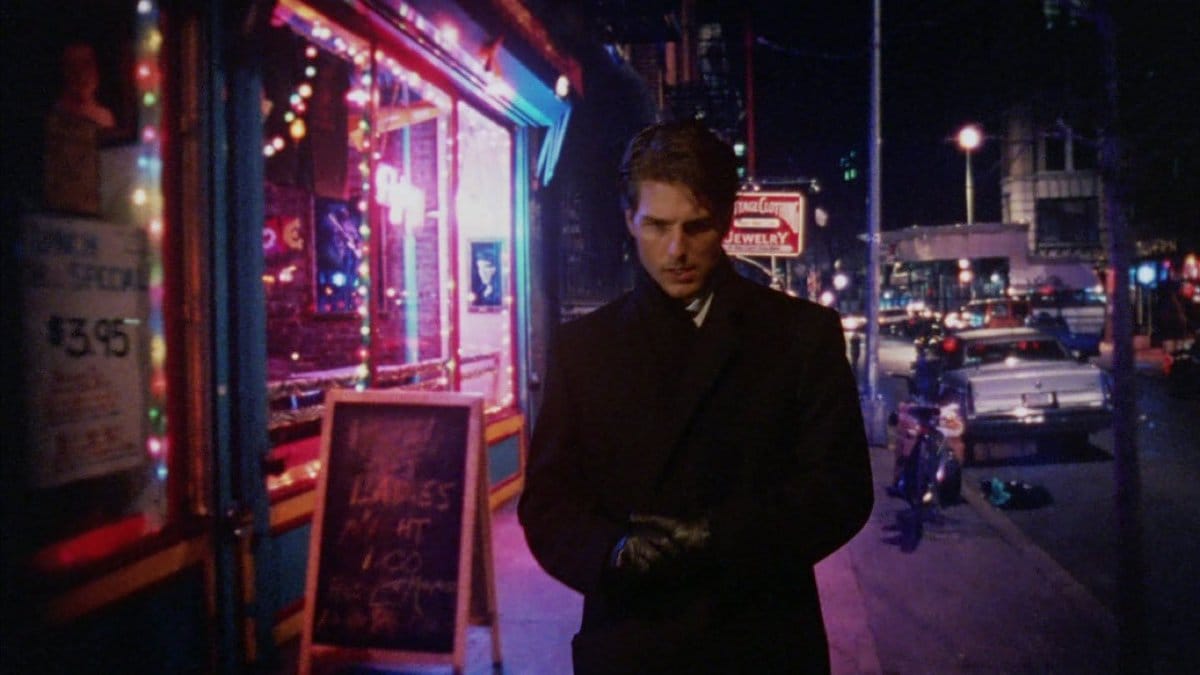
Not that anyone asked, but my number one and number two all-time favorite Christmas movies are, respectively, Eric Rohmer’s My Night at Maud’s and Whit Stillman’s Metropolitan. Nostalgia might have me throw in Gremlins, Home Alone, A Christmas Story, and the 1970 musical Scrooge, in which Albert Finney’s wildly theatrical overacting can be seen from space without a telescope.
Not featured among this company would be Eyes Wide Shut, a movie that, despite having been released in the summer of 1999, has successfully made the transition from ironic to non-ironic Christmas film. The irony is due to the film’s distinct absence of, uh, holiday cheer; the authentic claim meanwhile comes down to its setting and the presence of more extensive Christmas lighting than just about any other movie.
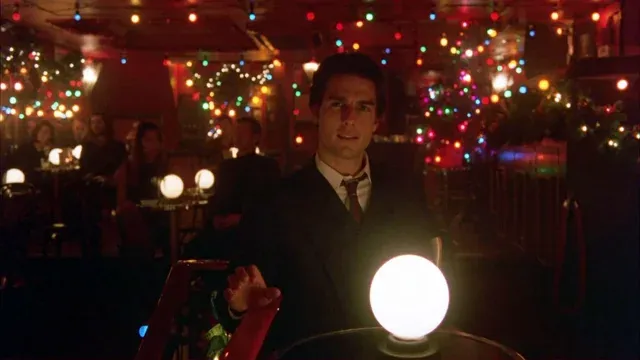
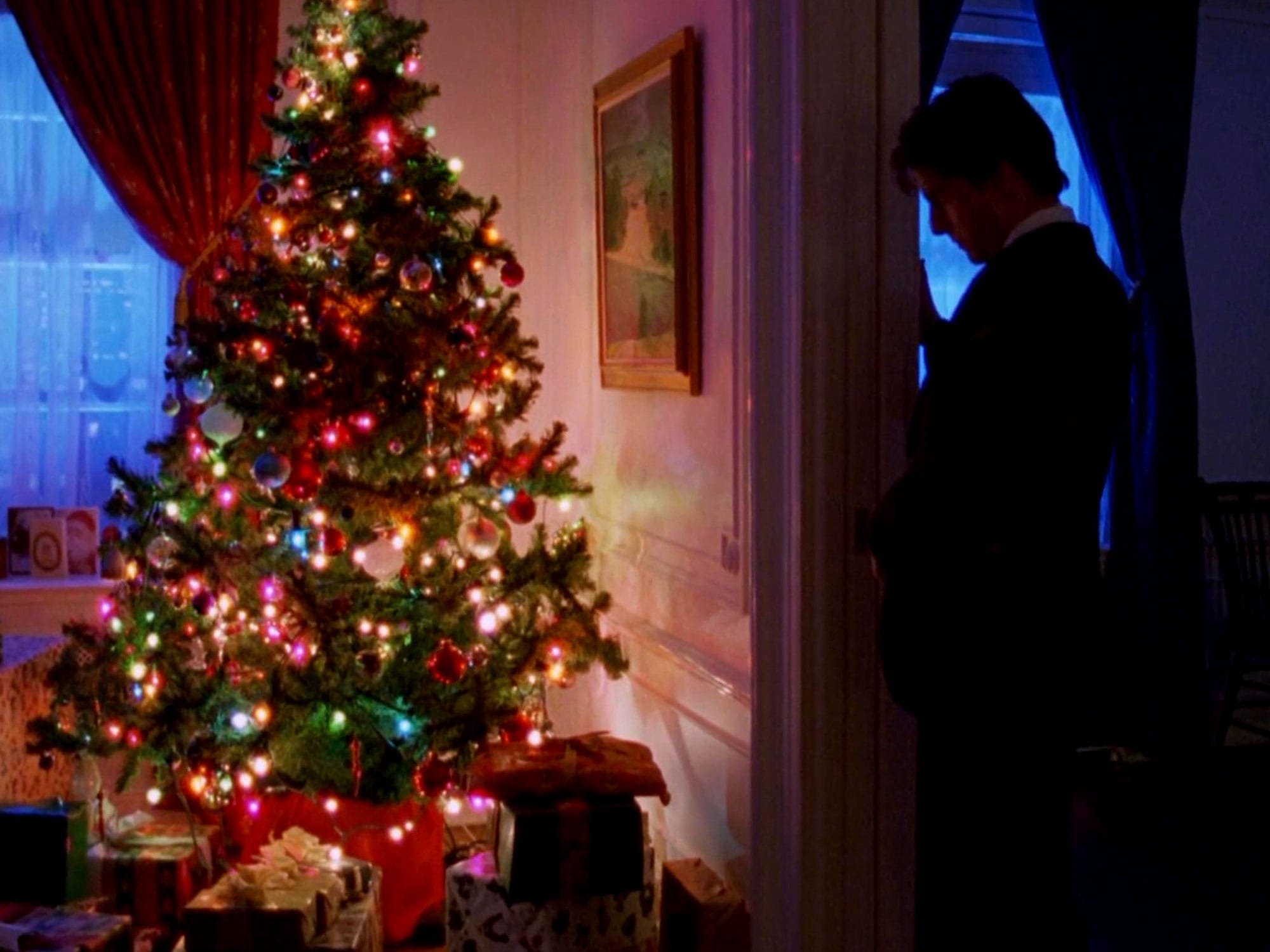
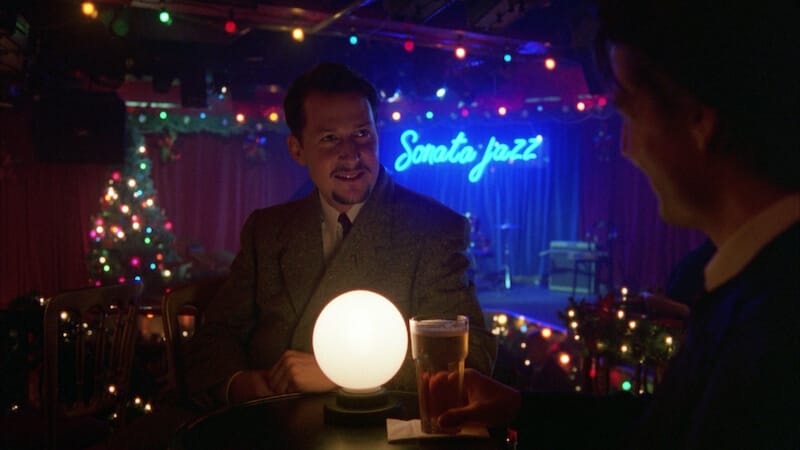
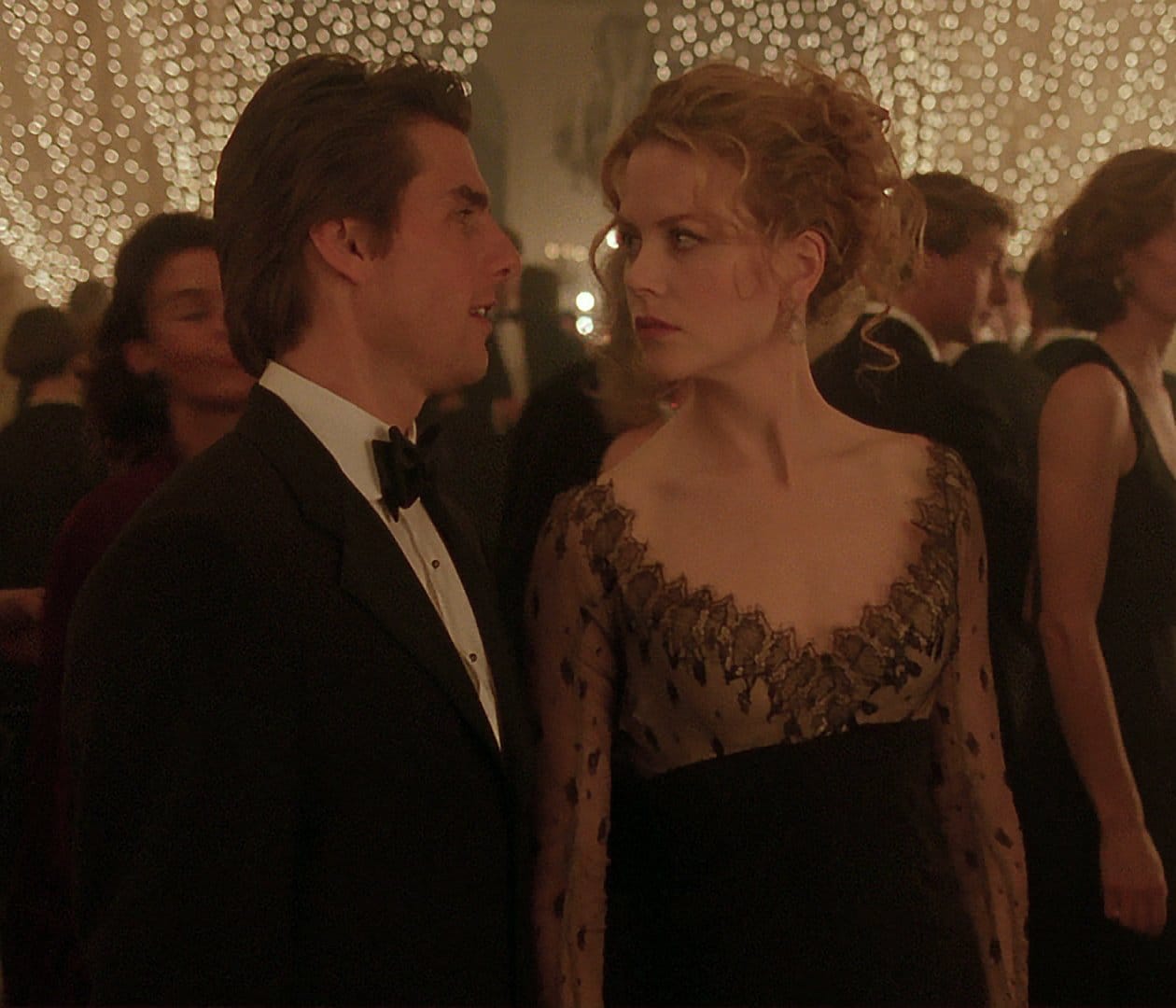
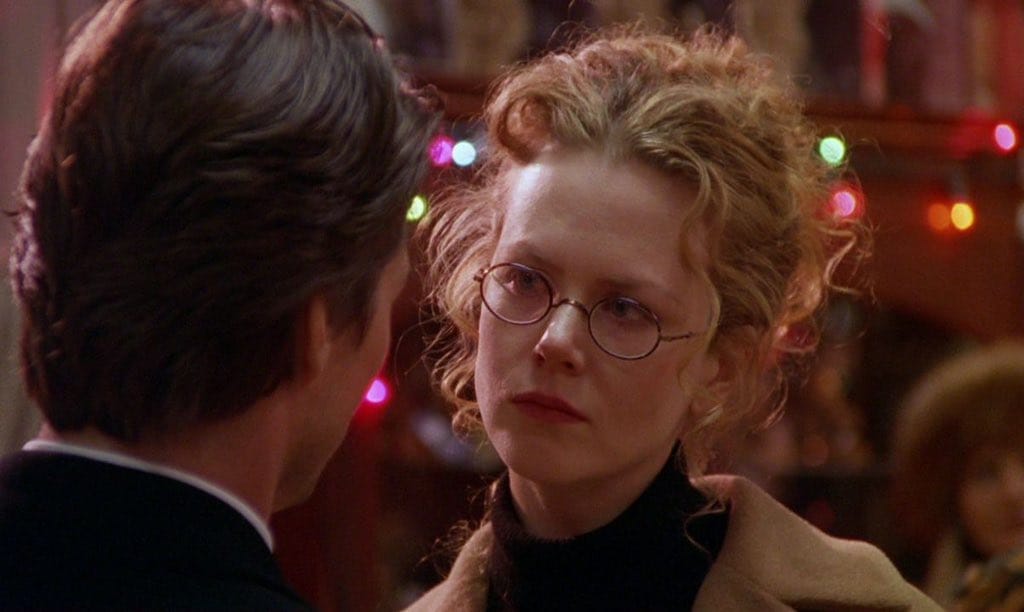
So much Christmas cheer
It has never been a favorite of mine, nor has any other movie of Stanley Kubrick — a director for whom I have generally felt respect rather than devotion. Nonetheless, I can recall the excitement that accompanied the announcement of his unretirement. This was generally an exciting time to be a budding cineaste (read: pretentious young man). Terrence Malick had recently made his first movie in two decades; now Kubrick had returned after 13 years. Meanwhile the efflorescence of irritating post-Tarantino knockoffs had given way to a more eclectic group of young American filmmakers—P. T. Anderson, Wes Anderson, David Fincher, Spike Jones, et al. doing interesting and original work (alas it proved something of a false dawn).
In any case, my initial viewing of Eyes Wide Shut was a disappointment: this promised exploration of troubling eroticism mostly left me cold. Mine was not a unique opinion, and it remains a deeply polarizing film—a problem compounded by the fact that Kubrick continues to attract the attention of a certain kind of wannabe cinephile bozo in a way that other masters like Welles, Kurosawa, et al. do not.
Returning to the film after many years, my central question was: had he made an unsuccessful erotic film or a successfully subversive unerotic one? Had I, in other words, misread the movie’s intentions and thus misjudged it? After much consideration, the answer I’ve come up with is: maybe?
What It's About
There’s virtually no point in reading about a movie you haven’t seen, unless you're the film equivalent of this guy.
Nonetheless, for those who need a recap, the basic plot is this:
Bill (Tom Cruise) and Alice (Nicole Kidman—a real-life married couple at the time) are married with a daughter and live a comfortably urban haute-bourgeois life in Manhattan. At the outset of the film, they attend a luxurious Christmas party thrown by a wealthy patient of Bill’s. At the party, each becomes the focus of amorous attention by others, but neither actually strays. Midway through the party, Bill is called away to provide medical attention to a prostitute, who has apparently overdosed following a sexual encounter with Ziegler, the party’s host—though he maintains confidentiality and doesn’t inform Alice of this. Upon returning home Bill and Alice make somewhat diffident love, with Alice appearing distracted.
The following evening, while smoking cannabis together, the two discuss the party. Under increasingly hostile questioning from Alice, Bill denies that he could ever be unfaithful to her or that he fears she might be unfaithful to him, prompting vicious laughter from Alice. In a series of long, unbroken shots, she confesses a sexual fantasy involving a naval officer she once spied on a vacation of theirs, of such intensity that she pondered leaving her family for him.
Her monologue is interrupted by a phone call informing Bill that a patient of his has died, and he leaves to pay his immediate respects. From this point on, while visibly consumed with jealousy, he falls into a series of increasingly bizarre adventures, all of them sexually-charged in some manner, culminating in his entry (under false pretenses) into a secret and ritualistic masquerade ball/orgy for some sort of über-elite clientele. Basically a more X-rated version of the Rothschild surrealist balls.
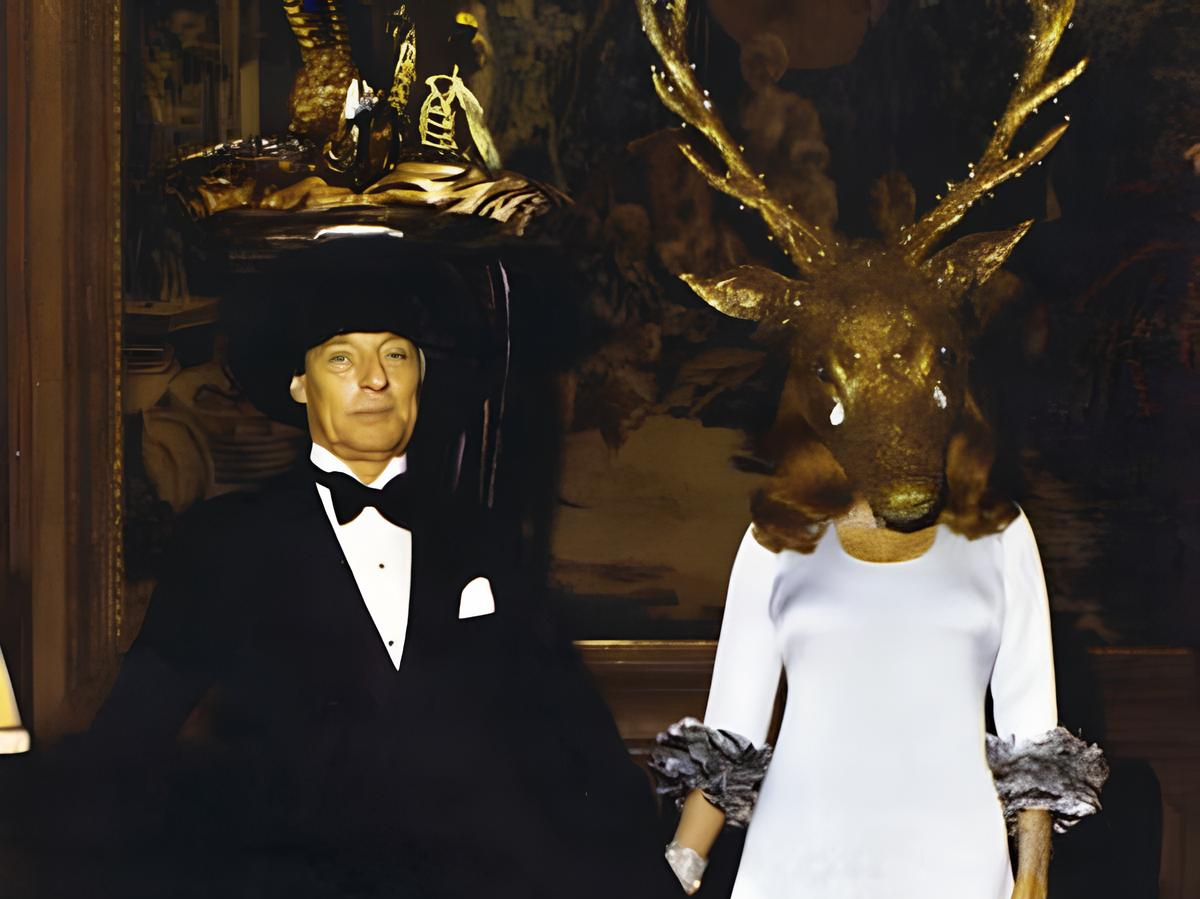
There, he is eventually unmasked and threatened with some terrible punishment, before a mysterious woman announces that she will redeem him by her own sacrifice, at which point he is released.
His subsequent attempts to discover what happened meet with increasingly sinister threats. When he reads of a young woman’s body being found, he visits the morgue, and it is revealed that she was both the prostitute at the first party and the woman who “saved” him at the orgy. He is then called to meet Ziegler again, who discloses that he was at the orgy as well and provides a prosaic if not entirely convincing explanation for all that Bill has witnessed over the past 48 hours. Bill returns home to find the mask he wore at the ball lying on his pillow, prompting him to confess his experiences to Alice. The next morning the two appear to reconcile.
Almost the entirety of the narrative is taken directly from Arthur Schnitzler’s Traumnovelle, an early 20th century psychological novella clearly indebted to Freud. The key exception is the framing device of beginning the film at Ziegler’s mansion for the party and returning there at the end for the explanation that may or may not tie everything together.
What It All Means
So, what is going on here?
First, never get high with Nicole Kidman. She is a mean stoner.
Second, I am more persuaded than before that the highly unerotic effect of this notionally erotic film is at least partly intentional (which is not to say that it is entirely successful—see below). That said, the only way to really make sense of this is to view nearly the whole of the film’s runtime as some sort of dream (or waking dream) of Bill’s, such that its unerotic treatment of sexual themes is a function of being filtered through his own unerotic consciousness.
The English translation of the source novel’s title is, after all, “Dream Story.” And it is almost certain that everything that happens from the time that the phone rings, cutting short Alice’s monologue, is a dream, or at least a fantasy. Virtually every encounter Bill has from that point on is in some way distorted, strange—often comically so. I might go so far as to call them Lynchian, except that these sequences are not peopled with the kinds of grotesques one finds in Lynch’s movies (on the contrary, most of the characters are ridiculously attractive). And even if one could accept a single strange event, it is improbable that they would occur successively in sequence. This is what Aristotle means when he claims a probably impossibility is preferable to implausible possibilities.
Consider that in the first evening alone—an evening that begins quite late, after he is already in a state of undress and under the influence of a narcotic—the following happens: the daughter of a recently deceased patient desperately declares her love for Bill, offering herself to him, only to be interrupted by the arrival of her fiancé. Bill then finds himself on an otherwise deserted (but beautifully and brightly lit!) Manhattan side-street, on which he is accosted by a gang of frattish young males who hurl extravagantly and graphically homophobic invective at him. Immediately following this, he is then propositioned by an impossibly attractive prostitute, who brings him back to her apartment and offers to provide whatever he wants.
The prostitute strongly resembles a model/actress, which is not so coincidental, seeing as she is played by a... model/actress. Her dialogue, meanwhile, plays not like what she would actually say, but what he would imagine her saying—she is coy about both her services and the price, being unwilling to describe just what she will do for him (ok, perhaps there really are prostitutes who are both this beautiful and this reticent—I am admittedly out of my element on this one—but it seems unlikely). The entire sequence plays, in other words, like what the nice doctor is prepared to imagine visiting a prostitute might be like, seeing as she neither looks nor sounds, well, as rough as a woman picking up strange men on nighttime streets likely would.
Subsequently, in a remarkable coincidence, he happens upon the very same club that an old acquaintance had previously mentioned he’d be playing at, whereupon this same friend reveals the existence of the top-secret orgy that is the film’s major set-piece. In need of a costume, he then a) somehow manages to get the proprietor of a shop to open for him after midnight, b) proceeds to have a completely non-sane conversation with him, c) discovers the proprietor’s underage daughter engaged him some sort of perverse tryst with a pair of Japanese businessmen.
Then, there’s the entire orgy sequence itself.
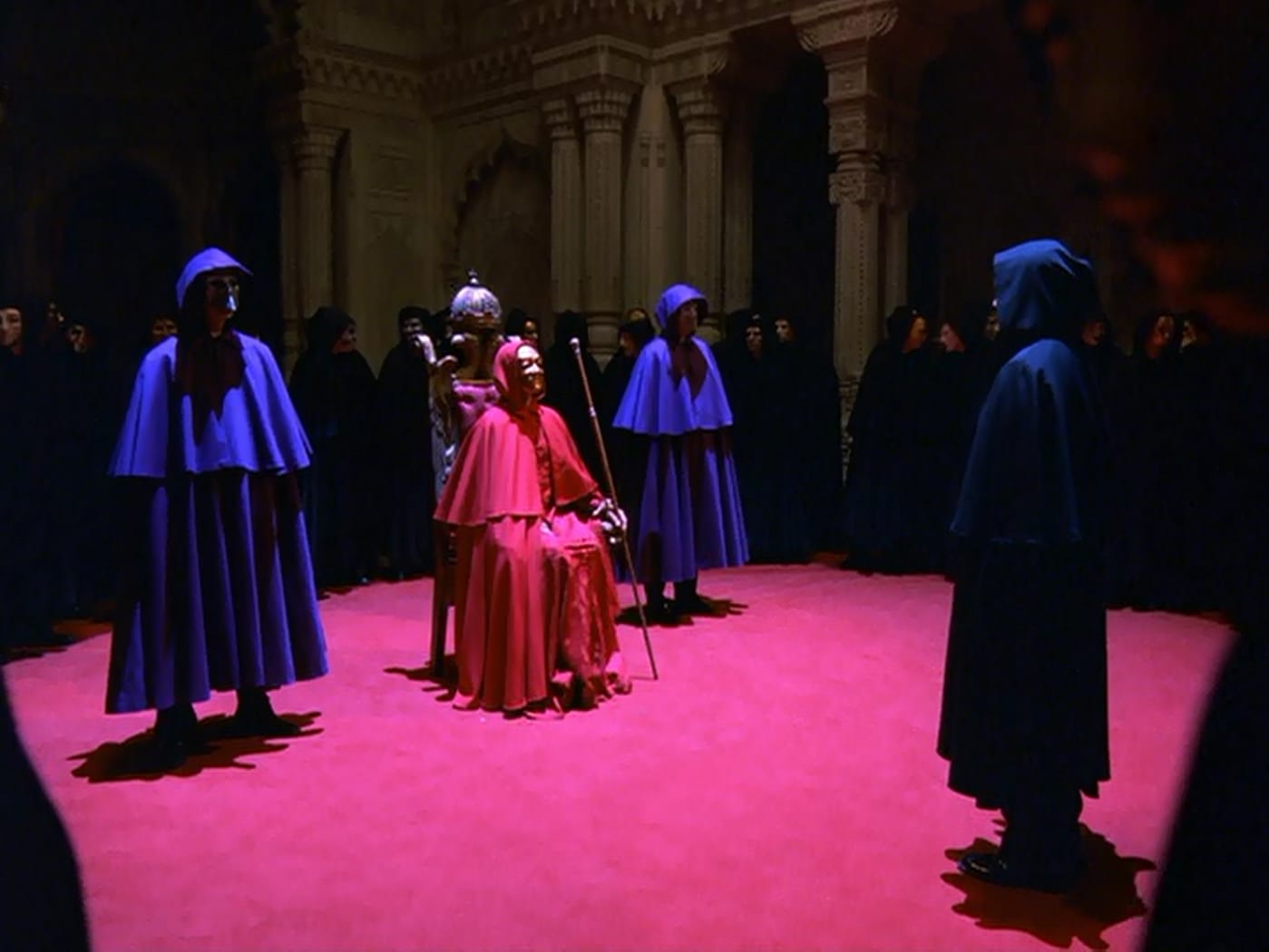
The dramatic mise en scène of the orgy sequence has dominated much of the commentary on the film (as it also did the advance press)—so much so, that many viewers have treated it with excessive literality. But even aside from the elaborate and slightly unreal staging of the event, the entire sequence operates on dream logic. Just note how at the party’s climax (the movie’s pun, not mine), in which Bill is made to stand trial before the other guests, he is led through several rooms, in which the guests are depicted as either observing or participating in various forms of sexual congress, only to emerge into a great hall with seemingly the entire company already assembled. This is not how waking life works but what we find in dreams, in which people disappear and reappear at random, or we find ourselves in houses with no intelligible architectural plan, or light switches suddenly fail to work, and so on.
And stepping back, the entire premise underlying this descent into some carnal phantasmagoria is just comically far-fetched. Bill is a successful doctor who looks like Tom Cruise in his prime! He is not going to have trouble having an affair in Manhattan if that’s what he wants to do! There’s really no need to go seeking out decadent pseudo-Rothschild parties in Westchester to make this happen!
Now, it must be said, that one can certainly make a film in which a series of unlikely events all transpire within a single evening—cf. Scorsese’s After Hours or Michael Mann’s Collateral or Walter Hill’s The Warriors, or for that matter Adventures in Babysitting—but these tend to be particular kinds of genre films, such as comedy or action, where we go in accepting certain premises underpinning the logic of the plot. I don’t mean to say that a film has to satisfy the assumptions of its audience in order to work; many films that quite consciously subvert those expectations work brilliantly. But drama generally requires a certain buy-in from the viewer in order to achieve dramatic effects.
Of course, there are other oneiric indicators. Every potentially sexual encounter throughout the night is in some way interrupted: the arrival of a woman's fiancé prevents their kiss from going further; a phone call from his wife prevents consummation with the prostitute; the intervention of the doomed junkie/guardian angel, who warns him to flee, stops him from retiring to a private location with another of the masked, nude women at the party. These highly convenient interruptions effectively keep Bill from participating in any form of debauchery whatsoever. Meanwhile, all of these incidents mirror the way that Bill’s real-life flirtation with the two models at Ziegler’s party is interrupted by the steward’s request that he assist Ziegler.
Similarly, from the time that Alice’s monologue is interrupted by the ringing phone through nearly the entire duration of the film, no character acts in a manner that remotely resembles ordinary human conduct—even by Kubrickian standards. Both the father who prostitutes his own daughter and the businessmen who undertake her services are outrageous depictions of debauched foreigners; Alan Cumming's concierge is a parody of a swishy homosexual; and so on. Even the more banal moments make little sense—e.g., Bill manages to ascertain which hotel his pianist friend was staying at by showing his medical license(?) to a café waitress(??). Bill returns to the prostitute’s apartment only to learn from her roommate that she has just that day discovered she is HIV-positive. What are the odds!
Finally, there is the film’s conclusion. The cathartic moment comes when Cruise returns to his home for the final time, only to discover his missing mask from the masquerade costume lying on his pillow opposite his sleeping wife, at which point he breaks down sobbing. When she awakens, however, she is startled by him, but at no point whatsoever does she appear to notice the INCREDIBLY CREEPY AND STRANGE MASK AND ITS INCONGRUOUS PLACEMENT ON THE PILLOW NEXT TO HER. (Fun fact: there are a variety of standard types of masquerade masks, all of which are featured in the orgy scenes; this particular kind is called a volto.)
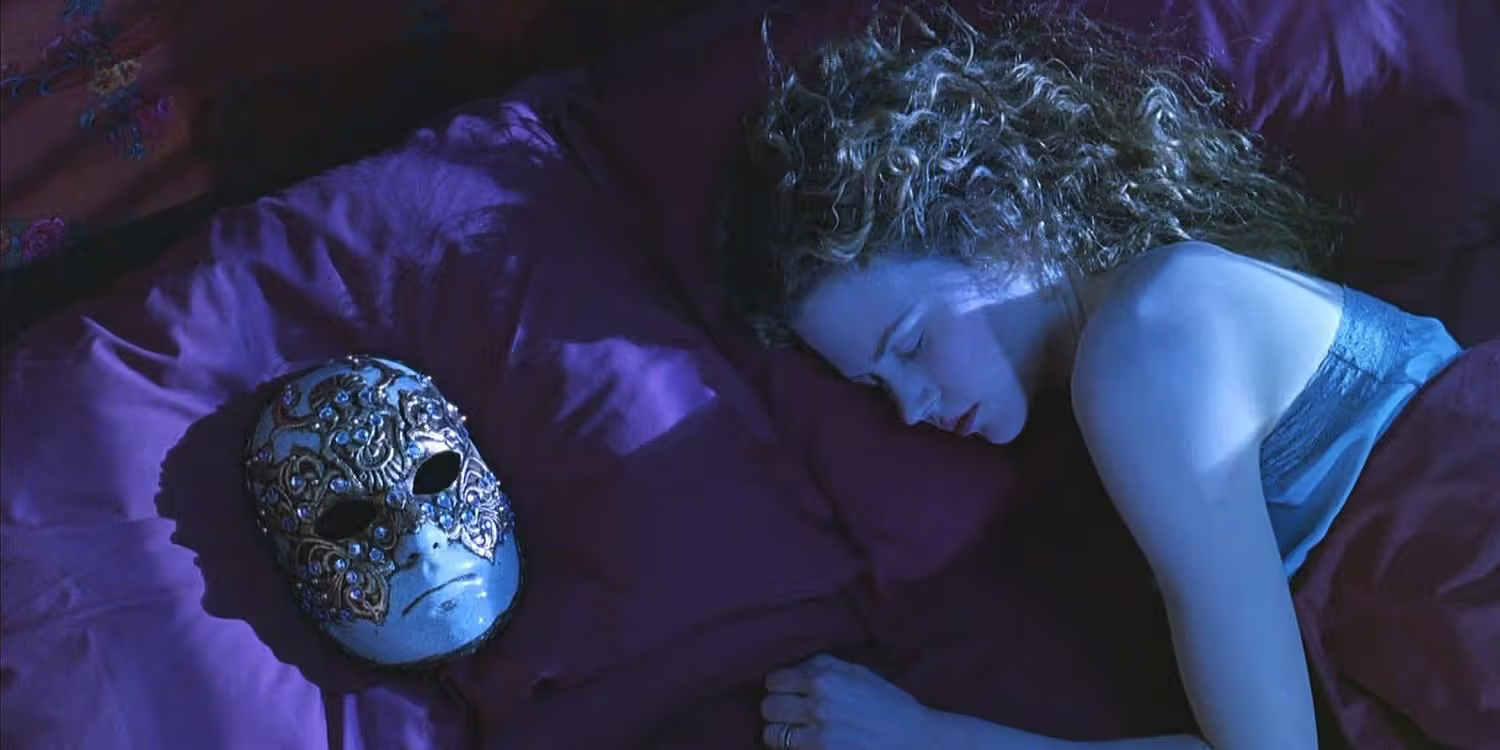
Then, while he swears upon waking her that he will tell her “everything,” we don’t see any of this confession, and the shot subsequently cuts to her in sitting teary-eyed in the early morning light, holding a cigarette and digesting whatever she’s heard. In their final conversation, in the banal and bourgeois setting of a department store, both husband and wife make repeated reference to their (mainly his) experiences as dreams. They do so haltingly, as though they aren’t themselves entirely sure about the line between dreams and reality—which in any case mirrors the film’s own treatment of the narrative.
What It Really Means
As above, the most plausible steel man case I can make for the mostly unerotic nature of this ostensibly erotic film is that nearly all the scenes are a product of the consciousness of a basically unerotic man.
Cruise’s decent and bourgeois Bill, who is perhaps a little complacent in his love for his wife, resembles the decent and bourgeois Gabriel Conroy of the James Joyce’s “The Dead,” who is also perhaps a little complacent in his love for his wife. The difference is that Alice’s revelation is entirely sexual, whereas Gretta Conroy’s is entirely romantic. (Interestingly, while I am unaware of any evidence that Arthur Schnitzler was influenced by “The Dead” in writing Traumnovelle, an earlier novel of Schnitzler’s was an acknowledged influence on Joyce’s Ulysses.)
As she begins work herself into a lather during their initial fight, Alice quite nastily presses him on whether he ever feels a hint of desire for a nude female patient, which he vehemently (if a tad sanctimoniously) denies. Of course, we have just witnessed him in just such a situation, examining an attractive young lady under the observation of a female nurse. Nor is he being hypocritical. We also see him attend to other patients (a boy and an elderly man), and there’s little noticeable difference in his conduct throughout.
Similarly, at the party, when he’s accosted by two gorgeous and friendly models, he doesn’t display much obvious lecherousness. He clearly enjoys the attention, but of course this too is thoroughly bourgeois! What he really desires is not the women themselves but the public attention of these women and all that signifies.
When Alice in her inebriated state (seriously, what was in that joint?), accuses him in vulgar terms of sleeping with them, he responds with defensive outrage. And I honestly don’t think this is a case of he-doth-protest-too-much: he seems genuinely appalled. And, of course, it makes sense that a man who is so shaken at the prospect of his wife’s infidelity would be disinclined to rock the boat on his end. Indeed, comparing the parallel party scenes, in which each attracts the interest of other members of the opposite sex, she appears to go far closer to the edge than he (also interestingly, she indicates awareness of his situation where he shows little notice of hers—the fantasy she reveals to him the next night really was a shock).
Remember that the haunting score—prominently featured in the film’s trailer—is drawn from György Ligeti’s Musica ricercata: a musical search. But what he is searching for? Ostensibly he is in search of some elusive erotic experience formerly denied to him, but he never quite manages to consummate any of these, and his interest in doing so is doubtful from the start. What he is really searching for is Alice, whom he never quite finds (a least until the end of the film proper). And this too is very reminiscent of dreams, in which we are looking for someone who remains just out of reach.
Notice also how Bill continues to move through the rooms of the ball, never quite lingering in any one place, and none of the staged sexual displays appear to hold his attention for very long. To take a contrasting example, the dream sequence in Labyrinth in which Jennifer Connelly is seduced by David Bowie’s Goblin King, and which also features a masquerade ball, is far more erotic than the explicit orgy scenes in Eyes Wide Shut despite the former’s PG rating, because Connelly’s character appears genuinely enchanted by the spectacle.
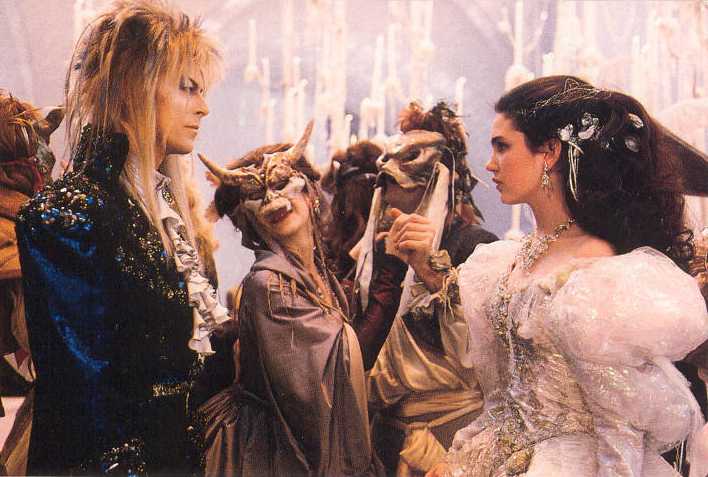
True, by the film’s conclusion, Bill is thoroughly humbled, but he is humbled not because he fails to satisfy his fantasies, but rather because he doesn’t seem to have such fantasies in the first place—at least with anything like the intensity of his wife’s. Perhaps the film’s most telling moment is when he finally returns home the first night only for Alice to awaken and recount her own dream, which functions as a counterpart to his. If the orgy/masquerade ball is the nightmarish, bizarro-world version of Ziegler’s party, then Alice’s dream (in which she copulates with multiple men) is the extreme and nightmarish version of the fantasy she confesses to Bill.
In his version of the orgy he remains a spectator (who is incidentally humiliated before the other guests as the only figure to be unmasked—sort of a horrifying adult version of the nightmare where you’re back in high school with no clothes on). In her version, she was an active participant, who laughs at him while he merely looks on. It's like the Simpsons joke where Bart tells Lisa "even your dreams are square."
All of this has been obscured by the prevalence of what I’ve come to think of as “bad Straussianism” in film criticism. This is to say, finding meaning in every detail no matter how trivial and without reference to any larger plausible scheme. And while there is no question that Kubrick was a highly controlled and purposeful auteur, I am not persuaded that his films warrant Talmudic exegesis, particularly given his penchant for striking and memorable images that, thanks to his remarkable gifts, retain a certain power regardless of any underlying meaning (or lack thereof). E.g., it is difficult to forget the bizarre shot that comes late in The Shining, as things really start to go straight to hell, when Wendy spies a figure in a grotesque (dog? bear?) costume seemingly about to fellate a tuxedo-clad man. But I defy anyone to come up with a credible explanation for it. It's just...creepy.
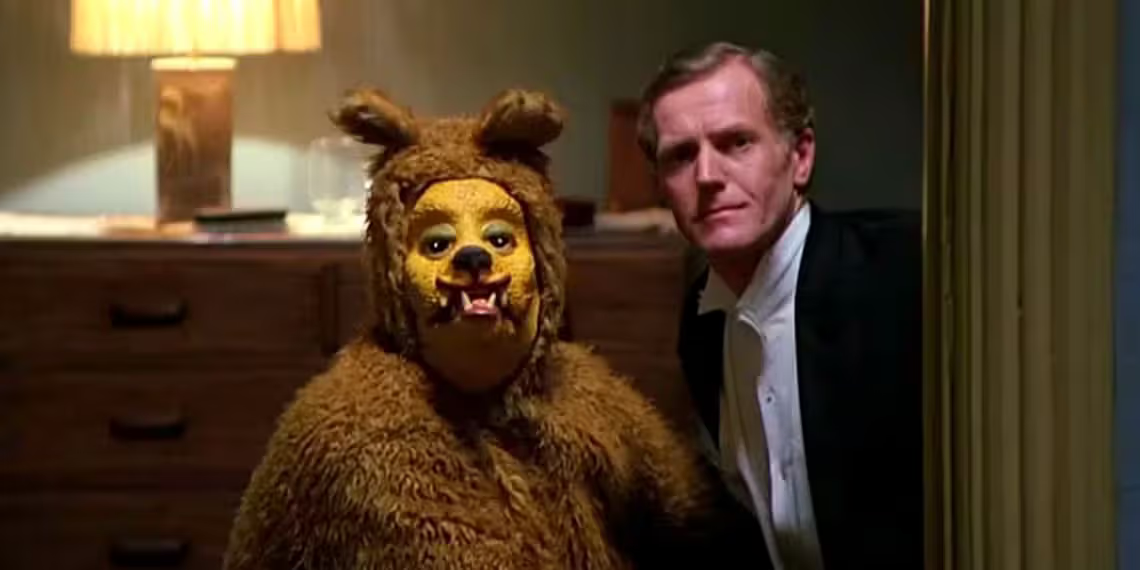
I would honestly not be surprised if Eyes Wide Shut had attracted more faux-intelligent-but-actually-stupid interpretative commentary than any other film out there. It’s an anti-consumerist manifesto! Various characters are actually animals in human form! Their daughter is kidnapped in the final scene (on behalf of the sinister secret society?)! I don’t know if it’s Kubrick’s hold over a certain type of would-be cinephile, or this film’s release at a particular time in which the proliferation of DVDs converged with that of the internet or what, but I have seen more schizophrenic rants masquerading as serious investigation with this one than with anything else (outside of maybe Christopher Nolan’s stuff, which to be fair seems designed to invite this sort of thing). And that's without even getting into what academic scholars have done with it.
Where misreadings are concerned, the theme of power and money is perhaps the biggest red herring and one that Kubrick himself admittedly emphasizes by inserting the scenes that bookend the narrative into Schnitzler’s plot: both those set at the extravagant party that introduce the film and the humiliating dressing down that Bill receives at the hands of the party’s host near the end.
Nonetheless, I think viewers who focus too intently on this theme are telling on themselves. The obsession with power and money is our own. It is clear enough that, owing to his vocation and zip code, Bill is in the position of being an objectively wealthy man who routinely associates with men occupying qualitatively superior echelons of wealth. For what it’s worth, this sort of thing breaks some people—cf. Black, Conrad. There are guys who can no longer enjoy flying first class once they’ve seen what it’s like to have your own plane.
But Bill does not, I think, evince much anxiety in this direction. His complacency is disturbed not by the evidence of wealth and corruption around him but by his wife’s simple fantasy. And that fantasy didn’t concern a figure like the unctuous (faux?) aristocratic European who attempts to seduce her at the party but a young naval officer who could hardly have been a man of any great means.
The point is that the film is not really an account of a bourgeois man who gets steamrolled by the real Masters of the Universe. Nor, however, is it about a flawed man finding dark and hidden places within his own psyche—think Jeffrey in Blue Velvet or Scottie in Vertigo. He is an ordinary and basically decent type—and the oddly sedate nature of his erotic adventures reflects this. (Seriously, think about your sickest, most perverse dreams along these lines—I guarantee you they were worse than anything shown here.) He remains, in the end, a wife guy.
The Verdict
So does the movie work? Visually it is spectacular. The lighting in the initial party scenes alone is just remarkable—vivid but also hazy enough that the viewer seems to experience the tipsiness of the protagonists. Similarly, the nighttime shots of Kubrick’s dream version of Manhattan are stunning. There’s a reason why stills from Eyes Wide Shut continue to feature prominently among the “one perfect shot” format beloved by cinephile accounts on social media.

Nonetheless, I don’t really think it works in the end. The pacing is odd, the structure of the narrative is uneven in a way that seems less dreamlike and more like its writer and director hadn’t worked out how to communicate the significance of the dream elements. More broadly, the film’s formal aspects—cinematography, composition, score—are at cross-purposes with its thematic ones, including not just the dialogue but the performances as well. And while this sort of juxtaposition can be artistically fruitful—e.g., the disconnect between Spacek’s affectless narration and the striking imagery in Badlands—I think here the result is simply a muddle, albeit one that is routinely explained away by overcomplicated analysis of the film.
As much as it makes sense that Bill’s erotic vision would be essentially limited (and thus comical in effect), Kubrick brings his considerable gifts to bear in emphasizing the dramatic elements of his experiences: the awesome staging of the ritual that opens the masquerade ball; the frankly terrifying use of the recurring piano motif in Ligeti’s Musica ricercata in the score; those endless Steadicam shots from the guy who basically invented the technique; the perfect blocking in scene after scene; the striking contrasts between the perfect figures and the masked features of the nude models at the orgy. Plus, stuff like the deeply creepy drawn-out scene in which Bill is clearly being followed by the mysterious bald man who in turn clearly wants Bill to know that he is being followed as they stare at one another across another implausibly empty Manhattan street. I could go on.
The result of all this is not so much deliberate ambiguity as what appears to be a confusion of sensibilities. And while the film is formally a comedy—in that it ends well for our protagonists—it fails to make us viewers feel the sense of fear and loss that we experience with, say, Mozart’s Magic Flute, which also ultimately ends well. Bill’s anxieties remain external to us, and he never really seems tempted by the darker appeals of eros. He is in the position of wanting to be tempted more than he is actually tempted—which is itself quite interesting, but also works against the otherwise dramatic visual elements of the film. The result is something like a Woody Allen film as directed by Stanley Kubrick.
And this is frustrating, because I think there is a core of moral seriousness and wisdom in this film. It is uncommonly adult in its awareness of the tensions between erotic life and married life, as well as the awareness of the very real stakes involved (one reason their daughter is present at the final scene is not—pace the good readers of Reddit—to indicate a subterranean theme of pedophilia, but to remind us of the stakes of their marriage and its continued success).
Recall that Alice still affirms her love for Bill even when unkindly recounting her extramarital fantasy—love isn’t the problem! The problem is desire, which marriage can contain but also constrain. And Bill has perhaps been a bit too complacent about such things. In the end, he is not much tempted beyond his marital bed, however much he might feel challenged to be by his wife’s own temptations. Rather, he has to accept that, as an erotic being, such temptations exist for her, even if she remains faithful (as she has, as far we as can tell).
We are of course these days living in a world that is saturated by sex—which is not the same thing as desire or eros. This is in some sense the world in which Bill is thrown for most of the film’s duration, in which sex is everywhere, but real desire is scarce. At the same time, entering into a marriage does not represent an escape from this problem, both because forgoing desire is itself an undesirable state to live in, and because it has a way of reemerging anyway.
Alice’s famous (or infamous) last line thus strikes me as wise. For, we have difficulty accepting that desire is neither guaranteed by the marriage contract nor a right to which we are entitled for the purpose of independent self-actualization. It is a force unto itself—one that a healthy marriage must accommodate in its own right and not simply treat as a natural function of marital love, and we disregard it at our peril.
Merry Christmas.
